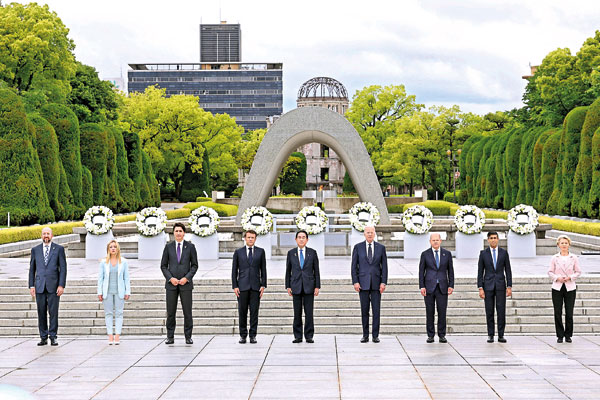Sunday Times 2
Japan in fresh drive to create a world without nuclear weapons
View(s):By Ameen Izzadeen
HIROSHIMA – Japan, the host of the summit of the world’s most advanced democracies, G7, is pushing for a reinvigorated drive to achieve global nuclear disarmament amid growing fears that Russia will resort to the nuclear option in its war with Ukraine. But a yawning gap remains between Japan’s good intentions and the ground reality.
With three hostile nuclear powers — Russia, China and North Korea — in its neighbourhood, Tokyo’s ambitious plan spearheaded by Prime Minister Fumio Kishida may appear to be too idealistic.
But given the high possibility of a nuclear catastrophe, following Russia’s invasion of Ukraine, an all-out effort to eliminate nuclear weapons is the urgent need of the hour. Besides, North Korea’s sabre rattling with regular missile tests and the growing big-power rivalry in the South China Sea are also stoking fears of a nuclear conflict.

(L to R) European Council President Charles Michel, Italy's PM Giorgia Meloni, Canada's PM Justin Trudeau, France's President Emmanuel Macron, Japan's PM Fumio Kishida, US President Joe Biden, Germany's Chancellor Olaf Scholz, Britain's PM Rishi Sunak and European Commission President Ursula von der Leyen pose for a photo after laying wreaths during a visit to the Peace Memorial Park as part of the G7 Leaders' Summit in Hiroshima on May 19. (Photo by JAPAN POOL / JIJI PRESS / AFP)
Perhaps, aware of the practical issues that complicate the call for the total abolition of nuclear weapons, Premier Kishida is adopting a somewhat realistic approach to achieve his world-without nuclear-weapons goal. To deliver his courageous message, he chose as G7 venue Hiroshima, the first and one of the only two cities that have suffered the brunt of an atomic-bomb attack, the other being Nagasaki. Kokura, the third city targeted for the attack, escaped the atomic-bomb attack because of a heavy cloud cover over the city.
At a pre-summit media briefing, Kishida vowed to send out a strong message to realise a world free of nuclear weapons through steady and more realistic and concrete efforts.
The three-day summit began on Friday in Hiroshima, Kishida’s home constituency, which was devastated by the world’s first atomic bomb attack carried out by the United States on August 6, 1945. It killed more than 140,000 people, including thousands of children, most of whom were in schools or at sites where they had been mobilised to engage in community work aimed at protecting the city from air raids. The death toll now stands at more than 330,000 people.
Premier Kishida’s five-point action plan includes:
- Call for a shared recognition on the need to continue the record of non-use of nuclear weapons
- Call to enhance nuclear weapons transparency
- Moves to reduce the nuclear weapons stockpile
- Nuclear non-proliferation and peaceful use of nuclear energy
- Highlighting the nuclear horror by encouraging visits to Hiroshima and Nagasaki
On Friday, US President Joe Biden visited the Hiroshima peace memorial and met atomic bomb survivors, known as Hibakusha in Japan. He is the second sitting US President to visit the city and the peace memorial. The first to do so was Barack Obama in 2016. Biden issued no statement after the visit to the peace memorial, which showcases the tragedy, the trauma and the charred horror inflicted on Hiroshima. “No more nukes,” the memorial cries out loud. But the world nuclear powers turn a deaf ear.
To hope that the heart-rending exhibits of the Hiroshima nuclear horror would move the leaders of G7’s three nuclear powers — the US, the UK and France — to dismantle their nuclear arsenals is wishful thinking.
Of the world’s nine nuclear power states, five are United Nations Security Council members — the US, Russia, China, the UK and France. Last year, they issued a joint statement saying, “Nuclear war cannot be won and must never be fought.” They declared their intent to remain committed to the Non-Proliferation Treaty. Yet, Hiroshima peace activists ask why some nuclear power states threaten to use nuclear weapons.
There was no declaration at the Hiroshima peace memorial, condemning the evil nature of nuclear weapons. Instead, Britain’s Rishi Sunak, Canada’s Justin Trudeau, France’s Emmanuel Macron, Germany’s Olaf Scholz and Italy’s Giorgia Meloni joined Kishida and Biden at the peace memorial. Also joining was the European Union President Ursula von der Leyen. In a tribute to the victims, they placed wreaths at the memorial built near the ground zero.
Issuing a disarmament message on Friday night, G7 leaders said, “We, the Leaders of the G7, met at a historical juncture in Hiroshima, which together with Nagasaki offers a reminder of the unprecedented devastation and immense human suffering the people of Hiroshima and Nagasaki experienced as a result of the atomic bombings of 1945. In a solemn and reflective moment, we reaffirm, in this first G7 Leaders’ document with a particular focus on nuclear disarmament, our commitment to achieving a world without nuclear weapons with undiminished security for all.
Beside the G7 members, Australia, Brazil, Comoros, the Cook Islands, India, Indonesia, South Korea and Vietnam are taking part as guests.
Explaining the fears about a nuclear attack by Russia in Ukraine, Premier Kishida said, “Conveying the reality of the nuclear attack is important as a starting point for all nuclear disarmament efforts.”
Stressing the importance of strict adherence to a rule-based international order, the Japanese leader said G7 would not accept “unilateral attempts by China and Russia to change the status quo by force.”
However, Premier Kishida’s ambitious drive for a nuclear-weapons-free world is challenged by stark security realities. Despite being a non-nuclear-power nation with a commitment towards nuclear disarmament and non-proliferation, Japan is compelled to come under the US nuclear umbrella.
In March this year, Washington proposed establishing a framework for nuclear deterrence-related training during normal times and a mechanism to determine how to respond in an emergency based on consultations with Japan and South Korea.

